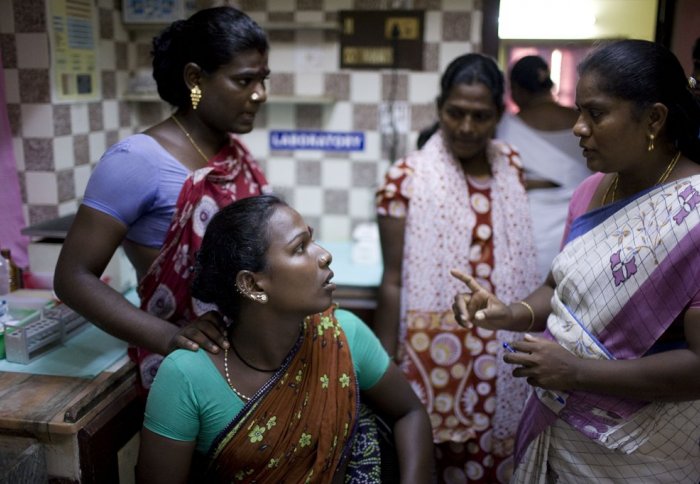Avahan Aids initiative may have prevented 600,000 HIV infections in India
by Sam Wong

Transgender sex workers counsel other sex workers about HIV/AIDS. Photo: Sanjit Das for Avahan, The Bill & Melinda Gates Foundation.
A programme in India may have saved around 600,000 people from becoming infected with HIV over the course of a decade, according to a new report.
Avahan, the India AIDS Initiative funded by the Bill & Melinda Gates Foundation and launched in 2003, aimed to prevent HIV transmission in the general population through a comprehensive HIV prevention programme including the promotion of condoms among the people at most risk – female sex workers, high risk men who have sex with men and intravenous drug users – in the six Indian states with the highest HIV rates.
In an evaluation of the project published in Lancet Global Health, researchers estimate that it prevented more than half of the infections that would have occurred without the Avahan intervention.
Avahan, an investment of over $250 million for the Foundation, involved outreach and risk reduction education programmes, condom distribution and social marketing as well as measures aiming to build community resilience and reduce the stigma attached to HIV. Funding and management of the programme is transitioning to the Indian government.
The main part of the evaluation was based on data from 24 districts in south India where Avahan operated, covering the period from 2004 to 2008. The authors used mathematical models to compare the observed trends in HIV infection, estimated through detailed epidemiological studies, with those that would have occurred in the absence of the increase in condom use following the initiative.
They found that in these 24 districts, 62,800 infections were prevented in the first four years of the programme. By extrapolating the results to all 69 districts in south India where Avahan operated, they estimate that 202,000 infections were prevented in those four years, increasing to 606,000 over 10 years.
Dr Marie-Claude Boily, from the School of Public Health at Imperial College London, said: “These findings suggest that the approach used by Avahan, of targeting high risk groups with behavioural interventions, adequate provision of prevention commodities and support for programmes to build community resilience, can be effective at controlling HIV in the population at large. Expanding the coverage of similar programmes could have a considerable impact on HIV epidemics in many parts of the world.”
Dr Peter Vickerman, from the London School of Hygiene & Tropical Medicine added: “If replicated, it is possible that the large scale expansion of this intervention to other settings in Asia and Africa could have a demonstrable impact on the worldwide HIV epidemic over the next decade.”
Dr Michael Pickles, also from the School of Public Health at Imperial, said: “The design of the evaluation itself, which was planned as an integral part of the programme, was innovative as it combined mathematical modelling with detailed data collection, which enabled us to conduct a rigorous analysis in a situation where it was not possible to conduct community-based randomised trials. Evaluating the impact of prevention programmes is crucial for determining which interventions should be prioritised.”
This multidisciplinary study, which was an international collaboration between different institutions, had numerous other components and was carried out through a grant from the Bill & Melinda Gates Foundation to the CHU de Québec for Dr Michel Alary research project. Drs Marie-Claude Boily and Michael Pickles from Imperial College London, UK and Peter Vickerman from the London School of Hygiene and Tropical Medicine were the lead mathematical modellers on this project. The other collaborators of this study were Dr. Anna Vassall from London School of Hygiene & Tropical Medicine, Drs. Stephen Moses and James Blanchard from the University of Manitoba (Winnipeg,Canada), Dr Lalit Dandona from the Public Health Foundation of India (New Delhi, India), Drs. Reynold Washington and B.M. Ramesh from the Karnataka Health Promotion Trust (Bangalore, India) and Dr Tinku Sarah from St-John’s Research Institute (Bangalore, India).
Reference
-
M. Pickles et al. ‘Assessment of the population-level effectiveness of the Avahan HIV-prevention programme in South India: a preplanned, causal-pathway-based modelling analysis’ Lancet Global Health, 30 September 2013. doi:10.1016/S2214-109X(13)70083-4 View
Article text (excluding photos or graphics) © Imperial College London.
Photos and graphics subject to third party copyright used with permission or © Imperial College London.
Reporter
Sam Wong
School of Professional Development